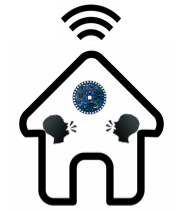Masterarbeit
 Voice-Based Indoor Location Identification in a Smart Home
Voice-Based Indoor Location Identification in a Smart Home
Completion
2020/04
Research Area
Students

Muhammad Rameel Qureshi Hashmi
Advisers


Description
In the recent years, Internet of Things (IoT) has been a current interest and has received close attention in the technology community. IoT is now a great source of economic growth in this modern world moreover and helps to make peoples life easier, brings comfort to their everyday living and improves the quality of life. The concept of a smart home based on IoT is one of the major research area in the digitalization industry. The smart home is described as a fully automated home equipped with multiple sensors and actuators where inhabitants can completely control the house functions. A Smart home based on voice commands is now presently the most rapidly growing area in which lots of new capabilities and features are required to meet the end user requirements. In the smart home, one of the most important factors is to detect the accurate position of the user to perform the actions accordingly otherwise without the user directly stating the current location, the wrong sensor may detect the voice command and will do false actions.
In outdoor environments Global Positioning System (GPS) helps us to track the user position accurately by using the principle called trilateration. Since GPS uses satellites to determine the location of users or objects, it can only be used outside the house and does not work for indoor localization. There are multiple other challenges and requirements that arises with the location identification system of the user. One challenge is to be able to identify the location under background noise which could be interfering with the voice-based location identification process. Moreover, the amount of time that the localization needs to correctly identify the location is a challenge. Finally, how to map the location of the user to the house structure is an important issue.
The objective of this Master thesis is to to identify the user location in home based on the intensity of the voice commands. In this approach the person should not need to specify the current location such as “turn on the lights in bedroom”, instead the system should be intelligent enough to detect the accurate position of the human i.e., stating the command “turn on the lights” and the system should detect that the person is in the bedroom. This thesis particularly includes the state of the art regarding the different indoor location identification mechanisms in the smart home and related domains. The demonstration of feasibility with an implementation prototype of the concept in the smart home is necessary. Moreover, a suitable evaluation of the approach is part of the thesis.




